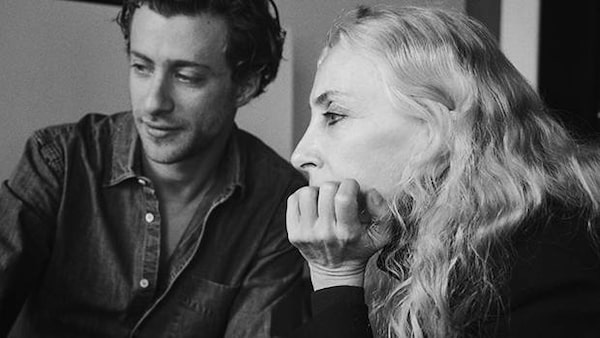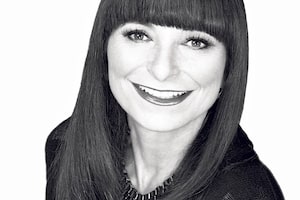
Francesco Carrozzini (left) directed the film Franca: Chaos and Creation to explore his relationship with his late mother, Vogue Italia editor Franca Sozzani (right).
The fashion business can be an all-consuming monster, and few know that better than the offspring of those who have toiled in its trenches. Just ask Francesco Carrozzini, the 34-year-old son of the late Franca Sozzani. The legendary editor-in-chief, who was at the helm of Vogue Italia until her death last December at the age of 66, was famous for her bold artistic vision and uncompromising attitude – a combination that gave birth to some of the most shocking and controversial editorials to ever grace a fashion glossy.
Sozzani's artful commentaries on everything from 2010's BP oil spill in the Gulf of Mexico to domestic violence and plastic surgery were a testament to her savvy and tenacity in a business that's too often concerned with pretty pictures, and pandering to advertisers and convention. Sozzani, who began her relationship with Carrozzini's father when he was still married to another woman, and who split with him when her son was 4, raised Carrozzini essentially on her own. And while the demands of her high-powered job constantly took her away from him, the two had a profound love for one another.
A photographer and filmmaker since his early teens, Carrozzini has composed a poignant love letter to his late mother in the form of a documentary, entitled Franca: Chaos and Creation, which debuted at the Venice Film Festival last year, and will be screened as part of Toronto Fashion Week on Sept. 7. Four years in the making, the film, as he puts it, is about "a mother and son and trying to understand this thing that took up so much of her life, which is fashion." I spoke with Carrozzini from New York recently about his mother's legacy, her relentless drive and her brazen vision.
Your mother was a hero for many and showed us that there was a way to be fantastical and artistic with integrity in a world that's becoming increasingly corrupt. What made you want to document her work in this way?
It came more from a personal need and that was to just turn the camera towards my one parent that was left, because my dad was dying when I started. As I went on, I realized that people didn't really know all she'd done, so I felt the need to tell her story, what she did, how she did it and why she was different from others. At the same time, I always wanted to make a film, but I never knew where to begin. Once someone told me to just talk about something you know, or that you feel close to, or find a story you want to tell in the right way. So I took that advice and those three things made me endure a lot.
Your mother often used fashion as a platform for social commentary. Do you think a fashion magazine is an appropriate platform for that?
It depends to what extent. I thought the domestic violence [fashion editorial] was a bit of a stretch. But you have to provoke sometimes to get a reaction. So I understand what she tried to do. Some of the other subjects portrayed like plastic surgery and oil…yes, that was pretty new to the whole world.
How do you think the role of fashion has changed for your generation?
It has changed. It's less fun in a way. There's less money, so in that sense, there's less freedom to do certain things. We're all fighting with a world that is changing. I remember it being way more free and fun when I was a kid. The money changed everything – the fact that you can't spend. Look at what Versace was doing for a show, look at all those parties and the carelessness and everything. What happened in the economy and in the world in the past twenty years has definitely made people more fearful. And that's not only in fashion. That happens everywhere. Movies are not made like they were made twenty years ago, and music isn't made the same way. Fashion has changed, upside down completely. But I think excellence really stands the test of time. That's what I think survives. The reason why my mother's work will be remembered for so long is because she did something that was so high quality, not only in terms of inventiveness and creativity – but what she did had quality. And I believe in quality. That's what she passed on to me.
What did she teach you about the necessity or refusal to compromise?
She wasn't good at compromising in life and in her work, and that's both a strength and a weakness. Compromise in work, but mostly in your personal life, is something that you need to be able to have. With my mother, it was either black or white. I respect that I'm not like that. I learned from watching her that I don't need to be so radical and uncompromising. But I must say, sometimes it gets a little scary because my mother wasn't freelancing. She worked for a company that put a lot of push behind her, and I work for myself, which is a completely different approach. But I really have started saying no, no, no, no, no to a lot of work. And the reason is because it doesn't interest me, or because I'd have to work with people I don't like, or because I think it won't give me anything, or make my work progress, or even give me enough money. So I started saying no. My mother was great at saying no. She always said no. It's good and bad. I haven't really decided where to draw the line yet. I'm still figuring it out.
Last spring, you and Bee Shaffer – the daughter of American Vogue's Anna Wintour – announced your engagement. Do you both see the world through a particular lens because of the work of your mothers?
I don't think we see the world through a different lens. What we do see is a lot of things in common. There's a lot of common background, and a lot of people that we know in common, because of the circles we lived in. I've experienced having relationships with people that came from somewhere very far and it was harder. Sometimes, the common background can help you whether that's cultural or social. From the inside, it doesn't feel that strange. But when people ask how I feel about being the son of Franca and the son-in-law of Anna, I realize it's like if Mick Jagger's daughter married Robert Plant's son, or if Sofia Coppola married a Kubrick. People often end up together just because of proximity, and we found each other this way. It's not as strange from the inside that it sounds on the outside.
Visit tgam.ca/newsletters to sign up for the Globe Style e-newsletter, your weekly digital guide to the players and trends influencing fashion, design and entertaining, plus shopping tips and inspiration for living well. And follow Globe Style on Instagram @globestyle.
 Jeanne Beker
Jeanne Beker